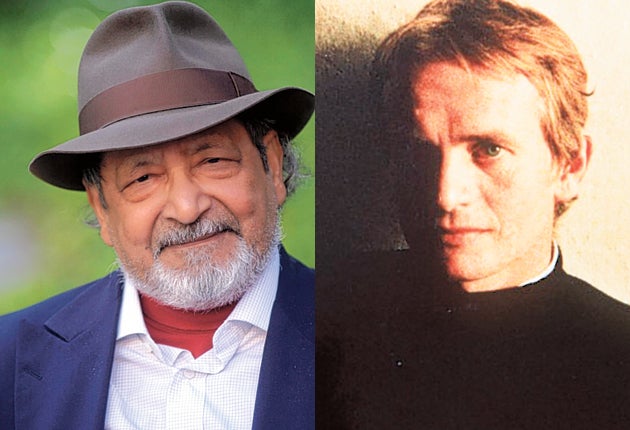Terence Blacker: We need these brilliant obsessives

At a time when the careers of successful authors are as carefully marketed as those of politicians, it is good to be reminded now and then of the true nature of the literary life – egocentric, brutal, unreliable and often fuelled by fantasy and rage.
Two sacred monsters of modern letters, Bruce Chatwin and Sir Vidia Naipaul, have been in the spotlight this month. Chatwin's letters, edited by his widow Elizabeth Chatwin and Nicholas Shakespeare, have confirmed that much of his self-created writerly image was a fake. Sir Vidia has strengthened his reputation as an ageing enragé with distinctly unattractive attitudes towards other races with a peculiar-sounding book called The Masque of Africa. "Repulsive," was Robert Harris's verdict in The Sunday Times. The book reminded him of the politics of Oswald Mosley.
Yet there is something heroic about these writers. Both were purists when it came to writing, putting their work before anything else. Chatwin's inventions and exaggerations about his life continued to the end – when he contracted Aids, he explained his illness with a variety of tall tales. One friend was told that it had been caused by the consumption of a thousand-year-old egg, another that he had been infected by bat faeces, a third that a rare fungus, known only among Chinese peasants and never previously recorded among Europeans, had attacked his bone marrow. Self-mythologising, it seems, was the way he took being an author seriously, the way he wrote the books that he did. The fact the humdrum truth has now been told, notably in a series of brisk footnotes written by Elizabeth Chatwin, makes not a jot of difference to the quality of that work.
In contrast, Sir Vidia has never cared about how the world has seen him, and indeed seems to revel in the bad opinion of others. By allowing Patrick French full access to write a brutally honest biography of him, he actively encouraged his unpopularity in the literary world. By all appearances, he is untouched by normal feelings of gratitude and affection, even to those close to him.
"Vidia was almost mystical in his belief in writing, for literary creation was a form of prayer, a disturbing prayer," Paul Theroux wrote in his superb book Sir Vidia's Shadow. "He was not the writer as equal, the reader's buddy, but rather the writer as priestly figure."
Any young author wanting to understand the purity and egotism of writing, not to mention the grim price often paid by innocent bystanders, needs only to turn to Sir Vidia's Shadow and Nicholas Shakespeare's biography of Chatwin. In an age when writers too often want to be the reader's buddy, we need these difficult, selfish, brilliant obsessives.
Litterbugs should pay for clean-up operation
Because public expenditure, by the Government or local councils or the BBC, is the issue of the moment, the action group which calls itself the Taxpayers' Alliance is taken rather seriously. With every new scandal, its spokesperson will be on hand to issue a suitably prim soundbite on behalf of that great victim of the moment, the taxpayer.
Occasionally, though, the Taxpayers' Alliance makes a complete fool of itself.
This week local government leaders have come up with a sensible solution to the growing problem of litter on the roads. Chucking stuff out of a car window or flytipping should be treated like any other motoring offence and be made subject to a fast-track fining system, they have argued. An estimated one in five motorists admits to littering as they drive but, unlike with a speeding offence, they are not legally obliged to supply the name of the offender. As a result, only those who discard rubbish while their car is stationary are prosecuted.
The Taxpayers' Alliance disapproves of this idea. Motorists are "tidy, law-abiding citizens", they say. They should not be victimised by "overzealous enforcement officers".
Has there ever been a sillier argument? The cost of clearing the rising tide of litter from our streets rose to an astonishing £858m last year. And who pays for all that? Er, the taxpayer.
'Old folks' as reality television stars?
Television executives have become uneasily aware of a tricky new conundrum. The population is ageing, a large number of their audience are, or will soon be, drawing a pension – yet viewers, on the whole, prefer not to see old faces on the screen.
They do their best to solve the problem. There are grim old-fart drama programmes like New Tricks. Earlier in the year, Newsnight Review invited a panel of oldies to consider items of oldie culture. BBC4 is probably planning a special Wrinklies Week.
All the same, the idea behind a new old folks reality show seems unlikely to do much to help the fight against ageism. A group of semi-famous celebrities are to be locked away in that now-familiar TV location – a house with cameras in it. All traces of modern life will be removed. The décor and furniture will be from 1975. Starsky and Hutch will be on TV. Newspapers and magazines from the same year will be left for them to read.
The idea behind the programme, which is based on a series of experiments conducted by the Harvard psychologist Ellen Langer, is to see whether returning old people to a time when they were in their heyday will rejuvenate them mentally and physically.
Lionel Blair will be asked to work with some dancers. Dickie Bird will hobble on to the pitch at Lord's. Kenneth Kendall, the newsreader, will be there, perhaps to read an item about a new pop group called the Sex Pistols. Among the roster of other people one had almost forgotten are Derek Jameson and Sylvia Sims.
I'm sure it is all thoroughly well-meant, but it sounds mildly cruel – or, at the very least, patronising.
terblacker@aol.com

Join our commenting forum
Join thought-provoking conversations, follow other Independent readers and see their replies